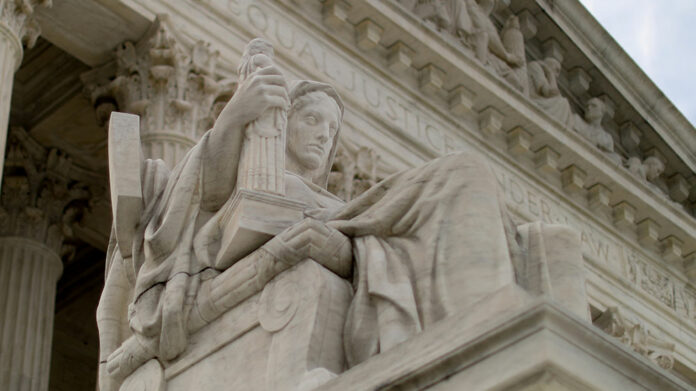President Donald Trump’s latest day of reckoning arrives on Tuesday.
Lawyers for Trump’s Department of Justice will argue in the Supreme Court of the United States that the president cannot be investigated while he remains in office, by either committees of the US Congress or local prosecutors in his hometown of New York City – both of whom are seeking his tax returns and financial records from the years before he took office.
More:
-
For first time, US Supreme Court arguments broadcast live
-
US Supreme Court sidesteps major gun rights ruling
-
US Supreme Court: Serious crime verdict requires unanimous jury
The court’s decision in the cases, expected in June, could shape the outcome of November’s presidential election and redefine the limits of presidential power for decades to come. Rulings against the president could result in the quick release of personal financial information that Trump has sought strenuously to keep private.
Before the coronavirus pandemic erupted, the cases marked the most politically treacherous proceedings against Trump since the impeachment hearings in January. If, as some have testified, the financial records show that Trump has been artificially inflating his net worth for decades – to both the general public and to the banks lending him money – the sheen on his career in business, one of the president’s primary selling points, could quickly lose its lustre.
The Supreme Court has combined three cases that Trump has lost every step of the way through the lower courts, and it will hear arguments via telephone on Tuesday morning.
Two of the three cases concern attempts by committees of the Democrat-controlled House of Representatives to enforce subpoenas seeking Trump’s financial records from his longtime accounting firm, Mazars USA LLP, and two banks, Deutsche Bank and Capital One.
Scott Turow’s prediction: Will SCOTUS give POTUS a pass?@ScottTurow https://t.co/WskyYqXgsI
— David Friend (@DavidMFriend1) May 11, 2020
From Mazars, the House Oversight Committee asked in April 2019 to see eight years of records after Michael Cohen, Trump’s former lawyer, told the committee that Trump had inflated and deflated certain assets on financial statements between 2011 and 2013 in part to reduce his real estate taxes.
From the banks, the House Financial Services Committee, which has been examining possible money laundering in US property deals involving Trump, wants the banking records of Trump, his children and his various businesses. The House Intelligence Committee, which is investigating whether Trump’s dealings left him subject to the influence of foreign individuals or governments, wants the same records and any others that identify “any financial relationship, transaction or ties” between Trump, his family members and “any foreign individual, entity or government,” according to the subpoena.
Investigators hope the records will reveal whether there are any financial links between Trump and Russia’s government, including any evidence that loans to Trump by Deutsche Bank were backstopped by Russian entities.
Deutsche Bank was the only major lender to conduct business with Trump in recent years – doing so despite the fact that he defaulted on loans worth hundreds of millions of dollars that the German bank made to him between 2004 and 2008.
➡️ Read this great breakdown of what to expect at SCOTUS this week and how to listen and follow along from home. Hi
Remember the Trump tax returns/financial documents cases will be heard on Tuesday! https://t.co/pSxgJx3UUn
— Katie Phang (@KatiePhang) May 11, 2020
The other case concerns a subpoena issued to Mazars for similar information, including tax returns, but this one was issued as part of a grand jury investigation into Trump being carried out by New York City’s District Attorney, Cyrus Vance, Jr, a Democrat.
Vance’s office sought in September of 2019 nearly a decade’s worth of tax returns from Trump and his organisations as part of a criminal investigation spurred by disclosures of hush payments made to two women who said they had past sexual relationships with him, including adult film actress Stormy Daniels and former Playboy model Karen McDougal.
In attempting to fend off House Democrats, Trump’s lawyers are arguing that Congress has no authority to issue the subpoenas, a broad assertion of presidential power. No sitting president has ever had his personal records subpoenaed, they insist, saying that even if Congress could issue the subpoenas, it lacks a valid legislative reason for doing so and has not stated with sufficient detail why it needs the documents.
The arguments draw on law review articles that will be very familiar to one member of the court. “At the end of the day, ‘a President who is concerned about an ongoing criminal investigation is almost inevitably going to do a worse job as President,'” Trump’s lawyers told the court in a filing, quoting from a 2009 article by now-Supreme Court Justice Brett Kavanaugh.
SCOTUS hears arguments on Trump’s financial records Tuesday. Here’s why Trump will lose the argument. https://t.co/HtusqbVziC
— Barb McQuade (@BarbMcQuade) May 9, 2020
In the case of the Vance subpoena, Trump’s lawyers argue that he is essentially immune from any criminal proceeding when in office. They have downplayed prior Supreme Court rulings regarding limits on the reach of presidential authority and point instead to Justice Department guidance that asserts that a sitting president cannot be indicted or prosecuted. In a lower court hearing, Trump’s lawyers went so far as to argue that law enforcement officials would not have the power to investigate Trump even if he shot someone on New York’s Fifth Avenue.
In two earlier cases over presidential power, the justices acted unanimously in requiring President Richard Nixon to turn over White House tapes to a Watergate special prosecutor and in allowing a sexual harassment lawsuit against President Bill Clinton to go forward.






